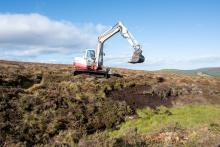Identifying key questions and leverage points for plant health in the natural environment

There is good evidence of the considerable risks to plant health from non-native plant pests in the natural environment (semi-natural habitats). In addition, stakeholders often lack awareness of these risks and may not always implement appropriate biosecurity measures. The challenge is how to implement actions that improve behaviours around plant biosecurity given the limited resources available and under-recognition of this issue within the natural environment and conservation sector.
This project used systems thinking to identify leverage points where changes in behaviour, attitudes or processes could improve biosecurity and hence plant health in the natural environment. Systems thinking is a way of framing the complex interactions between people, organisations, processes and policies. Leverage points are places within these complex systems where intervention can cause transformative change.
Through a workshop, key leverage points were identified at project, organisational, and systemic levels. Recommendations include the identification by Scottish Government of a responsible organisation for plant health in the natural environment, integrating biosecurity into conservation best practices, and including it in grant schemes for habitat restoration. Other key actions involve mainstreaming biosecurity within government policies, improving plant health monitoring, and balancing biosecurity with biodiversity goals.
Image of Hag Reprofiling courtesy of Scot Ramsey© (The James Hutton Institute)
